
News |
- Witnesses Speak Out At Hearings
- NEB Stops BC power line
- US Investigates Abrupt Climate Change Scenario
- South Indian Lake Seeks to Suspend Wuskwatim Hearings
- Manitoba Wildlands Cross Examines Manitoba Hydro
- CNF - Species Review Puts Economics Before Science
- Low Water Impacts Manitoba Hydro Earnings
- Manitoba Energy Web Site Launched
- Canada's Boreal Forest - NRDC 2004 BioGems
- Minnesota Bill Requires Hydro Imports Study
- Call to Protect Pacific Ocean - CNF
- New Oil Drilling In Alaska's North Slope
Witnesses Speak Out At Hearings |
17 March 04 |
 Two Minnesota Senators are among the witnesses who made presentations this week at the Manitoba Hydro Wuskwatim Projects hearings before Manitoba’s Clean Environment Commission (CEC). They and others have been invited to speak by Manitoba Wildlands, Canadian Nature Federation (CNF).
Two Minnesota Senators are among the witnesses who made presentations this week at the Manitoba Hydro Wuskwatim Projects hearings before Manitoba’s Clean Environment Commission (CEC). They and others have been invited to speak by Manitoba Wildlands, Canadian Nature Federation (CNF). “Public participants continue to provide information that Manitoba Hydro has not”, said Gaile Whelan Enns, Manitoba Wildlands Director, CNF. First Nations rights, wind energy economy and policies in Minnesota, impacts from transmission corridors, and climate issues are among the topics addressed by Manitoba Wildlands, CNF presenters, most of whom are volunteers. Peter Kulchyski, Director of Native Studies at the University of Manitoba; Minnesota wind farmer and County Commissioner, Jim Nichols; Minnesota lawyer Tim Rudnicki; Campaign Director of the International Rivers Network, Patrick McCully; Albertan biologist, Erin Bayne; and Minnesota Senators Ellen Anderson and Gary Kubly present this week. View hearing summaries, presentations, and links at: EnergyManitoba.org Source: Manitoba Wildlands, CNF |
|
NEB Stops BC power line |
15 March 04 |
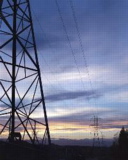 On March 4, 2004, Canada's National Energy Board (NEB) denied an application from Sumas Energy 2, Inc. (SE2) to construct the Canadian portion of an 8.5-kilometer international power line (IPL) from Sumas, Washington, USA to a hydro substation in Abbotsford, British Columbia. The decision on the application followed 39 days of public hearing held in Abbotsford.
On March 4, 2004, Canada's National Energy Board (NEB) denied an application from Sumas Energy 2, Inc. (SE2) to construct the Canadian portion of an 8.5-kilometer international power line (IPL) from Sumas, Washington, USA to a hydro substation in Abbotsford, British Columbia. The decision on the application followed 39 days of public hearing held in Abbotsford.The IPL would have permitted SE2 to transport electricity from a proposed US-based Power Plant to BC Hydro's Abbotsford, B.C. substation. According to the NEB news release, the Board “decided that it was unable to come to the conclusion that the IPL would be in the Canadian public interest and would be required for the present and future public convenience and necessity.” The National Energy Board is an independent federal agency mandated to regulate several aspects of Canada's energy industry. View the National Energy Board news release Source: National Energy Board |
|
US Investigates Abrupt Climate Change Scenario |
15 March 04 |
 An October 2003 report (released February 2004) detailing an abrupt climate change scenario has caused a stir in the US and around the world. One of the main reasons for all the interest and media coverage is its source. Andrew Marshall, the director of the Office of Net Assessment for the US Department of Defense commissioned the report, which in contrast to most climate change studies that examine global warming over more than a century, explores an abrupt climate change scenario.
An October 2003 report (released February 2004) detailing an abrupt climate change scenario has caused a stir in the US and around the world. One of the main reasons for all the interest and media coverage is its source. Andrew Marshall, the director of the Office of Net Assessment for the US Department of Defense commissioned the report, which in contrast to most climate change studies that examine global warming over more than a century, explores an abrupt climate change scenario.Report authors Peter Schwartz and Doug Randall assert that the scenario discussed is plausible, they caution that it is unlikely; the occurrences outlined would likely impact specific regions, rather than globally, and the magnitude of events may be significantly smaller. The research suggests that once temperature rises above a certain threshold, adverse weather conditions could develop relatively abruptly, resulting in temperature decreases in some regions of 5-10 degrees Fahrenheit in a single decade. The report explores how such an abrupt climate change scenario could potentially de-stabilize the geo-political environment.. The report concludes by suggesting that because of the potentially dire consequences, the risk of abrupt climate change should be elevated beyond a scientific debate to a U.S. national security concern. The US Defense Department and report authors defend the extreme nature of the scenario. “The Defense Department continuously looks ahead to ensure that we are prepared in the future for any contingency,” Marshall said. Author and long-time Pentagon consultant Peter Schwartz noted that the report reflects the Pentagon's policy of planning for the worst. View the US Defense Department commissioned report (hosted on Environmental Media Services site) View the Fortune Magazine article View the Night Ridder Newspaper article Sources: US Defense Department report, Fortune Magazine, Knight Ridder Newspapers |
|
South Indian Lake Seeks to Suspend Wuskwatim Hearings |
12 March 04 |
 The Community Association of South Indian Lake (CASIL) filed a motion on Wednesday, March 10, 2004 that if accepted as filed, would require the Clean Environment Commission (CEC) to suspend the current Wuskwatim hearings. The motion asks the CEC to require Manitoba Hydro and Nisichawayasihk Cree Nation (NCN) to provide full and sufficient information regarding the nature and amount (if any) of compensation that will be paid for impacts to NCN as a result of the Wuskwatim projects.
The Community Association of South Indian Lake (CASIL) filed a motion on Wednesday, March 10, 2004 that if accepted as filed, would require the Clean Environment Commission (CEC) to suspend the current Wuskwatim hearings. The motion asks the CEC to require Manitoba Hydro and Nisichawayasihk Cree Nation (NCN) to provide full and sufficient information regarding the nature and amount (if any) of compensation that will be paid for impacts to NCN as a result of the Wuskwatim projects.Central to the motion is the ability of the CEC to compel parties to provide information that may relate to or indicate an impact on the financial feasibility of the Wuskwatim projects. CASIL argues that the process for final agreement on compensation that may be required to be paid to NCN as a result of the Wuskwatim projects has not been concluded prior to the formal commencement of the current environmental review and licensing process. Many of the residents of South Indian Lake are members of the NCN Indian band. All, including Métis residents, are potentially eligible for compensation. Download the CASIL motion |
|
Manitoba Wildlands Cross Examines Manitoba Hydro |
12 March 04 |
 Manitoba Wildlands - CNF spent 4 hours asking Manitoba Hydro's panel of experts questions regarding the "justification, need for and alternatives to" the Wuskwatim projects on Tuesday, March 9.
Manitoba Wildlands - CNF spent 4 hours asking Manitoba Hydro's panel of experts questions regarding the "justification, need for and alternatives to" the Wuskwatim projects on Tuesday, March 9. Questioning was led by legal Counsel Eamon Murphy of Woodward and Company Barristers and Solicitors, along with Manitoba Wildlands - CNF Director, Gaile Whelan Enns. Several questions were asked to determine whether Manitoba Hydro supports Manitoba government initiatives and policies with regard to climate change, wind energy and other new renewable energy sources. Manitoba Hydro continues to assert that the Wuskwatim projects are good for all Manitobans and have little or no environmental impact. Manitoba Hydro responded to questions about carbon stock and carbon issues by refusing to accept the importance of up to date and transparent, project specific carbon inventory and emissions reporting. They contend that carbon inventories and emissions policies should be applied only on a system-wide basis. Manitoba Wildlands also asked questions about present and future grid interconnections, the extent and availability of information on wind power, the impact Waskwatim was likely to have on the development of wind power in Minnesota, NAFTA and climate change policy. They also asked Manitoba Hydro to define the term, "low impact dam." The utility is to provide its climate change policy to the Clean Environment Commission hearings next week. For daily updates and summaries of the Wuskwatim project hearings proceedings, which continue through March and early April, visit Energy Manitoba View the daily transcripts View the Manitoba Wildlands Wuskwatim page |
|
CNF - Species Review Puts Economics Before Science |
8 March 04 |
 The Canadian Nature Federation (CNF) is concerned about the March 3, 2004 announcement made by Canada's Environment Minister David Anderson for a process to seek public input on the costs and benefits of adding 63 wildlife species to the Species at Risk Act (SARA) legal list. The Department of Fisheries and Oceans has also embarked on a similar process of public review for 10 marine species. Each of these species have already been determined by the Committee on the Status of Endangered Wildlife in Canada (COSEWIC) to be at risk of extinction.
The Canadian Nature Federation (CNF) is concerned about the March 3, 2004 announcement made by Canada's Environment Minister David Anderson for a process to seek public input on the costs and benefits of adding 63 wildlife species to the Species at Risk Act (SARA) legal list. The Department of Fisheries and Oceans has also embarked on a similar process of public review for 10 marine species. Each of these species have already been determined by the Committee on the Status of Endangered Wildlife in Canada (COSEWIC) to be at risk of extinction."Economic factors should have no place in determining whether or not these species are listed under SARA." Noted Julie Gelfand, President of the Canadian Nature Federation. "Determining whether a species is endangered is a question of science, not economics. The place for considering social and economic issues is during the recovery planning process." The Canadian Nature Federation is calling on the federal government to abandon their public review process, or, as a minimum, only allow for the consideration of scientific information at this stage of the listing process. View the Government of Canada Consultation web site on amending the List of Species Under the Species At Risk Act View the document: 'Consultation on Amending the List of Species Under the Species At Risk Act March 2004' View the SARA web site Source: Canadian Nature Federation |
|
Low Water Impacts Manitoba Hydro Earnings |
8 March 04 |
 Manitoba Hydro is reporting a net loss on consolidated electricity and natural gas operations of $334 million for the nine months ended December 31, 2003. In the same nine-month period last year, the utility showed a net surplus of $38 million. Hydro says that continued low water conditions are the main reason for the losses in the electricity sector.
Manitoba Hydro is reporting a net loss on consolidated electricity and natural gas operations of $334 million for the nine months ended December 31, 2003. In the same nine-month period last year, the utility showed a net surplus of $38 million. Hydro says that continued low water conditions are the main reason for the losses in the electricity sector.Water supply conditions for the past year have approached the lowest levels on record for most of Manitoba and Northern Ontario. Water supplies in the Nelson River and Churchill River watersheds are at a 27-year low. To ensure that enough water is available to meet customers' needs when peak electricity use occurs in Manitoba (during winter), the utility has been importing power as needed and discontinuing most non-firm export sales. Costs to purchase power this year have increased $300 million and power exports have declined $82 million compared to the same period last year. Historical records indicate that droughts will occur on average once or twice every ten years. For this reason, Manitoba Hydro incorporates the risk of drought in its long-term financial plans and builds its retained earnings during years of good water flows. Over the past decade, good water flows and strong export sales have allowed Manitoba Hydro to build retained earnings and maintain low electricity rates for its customers. View the February 19, 2004 Manitoba Hydro press release Source: Manitoba Hydro |
|
Manitoba Energy Web Site Launched |
2 March 04 |
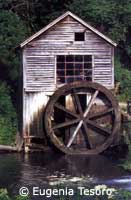 As a public participant in the Clean Environment Commission (CEC) review of the Wuskwatim Generation and Transmission projects, Manitoba Wildlands has just launched Energy Manitoba (http://energymanitoba.org), a new web site designed to provide services for public participants and others interested in the Wuskwatim projects proposed by Manitoba Hydro / Nisichawayasihk Cree Nation. Daily summaries of hearing highlights, updates to the Wuskwatim hearing process, schedules, documents, and links will be available on the site.
As a public participant in the Clean Environment Commission (CEC) review of the Wuskwatim Generation and Transmission projects, Manitoba Wildlands has just launched Energy Manitoba (http://energymanitoba.org), a new web site designed to provide services for public participants and others interested in the Wuskwatim projects proposed by Manitoba Hydro / Nisichawayasihk Cree Nation. Daily summaries of hearing highlights, updates to the Wuskwatim hearing process, schedules, documents, and links will be available on the site.View the new Energy Manitoba site |
|
Canada's Boreal Forest - NRDC 2004 BioGems |
26 February 04 |
 Natural Resources Defense Council, a U.S.-based environmental organization, is featuring Canada's boreal forest in its annual list of the dozen critical natural areas in the Americas. NRDC's international effort to protect the Western hemisphere's wildlands, the BioGem campaign, will mobilize citizen action over the coming year to protect Canada's boreal forest and 11 other extraordinary areas, ranging from the Alaskan arctic to the Amazon rainforest.
Natural Resources Defense Council, a U.S.-based environmental organization, is featuring Canada's boreal forest in its annual list of the dozen critical natural areas in the Americas. NRDC's international effort to protect the Western hemisphere's wildlands, the BioGem campaign, will mobilize citizen action over the coming year to protect Canada's boreal forest and 11 other extraordinary areas, ranging from the Alaskan arctic to the Amazon rainforest. "We see Canada's boreal forest as one of the Earth's greatest conservation opportunities," said Susan Casey-Lefkowitz, NRDC senior attorney. "This is one of the largest intact forests left on the planet." "Our actions as U.S. consumers have a major impact on Canada's boreal wilderness and part of our approach at NRDC is to educate our members and the broader U.S. public on how our use of electricity and forest products affect the health of the boreal forest," said Casey-Lefkowitz. Manitoba Hydro sells almost 40% of its electricity to the United States and Manitoba Hydro plans new dams and transmission lines that would have a negative impact on these forest regions. "Manitobans support the protection of their globally significant forest regions," said Gaile Whelan Enns, Manitoba Wildlands. "The Manitoba government needs to ensure protected areas are in place before hydro, forestry or mining interests expand into the heart of the boreal." Working in cooperation with indigenous communities and other environmental groups including Manitoba Wildlands and Canadian Parks and Wilderness Society (CPAWS), NRDC is asking the Ontario and Manitoba provincial governments to protect and conserve this globally significant forest. "We welcome the awareness and support that NRDC members bring to the efforts to conserve this spectacular area," said Anna Baggio, CPAWS-Wildlands League. View the NRDC Heart of the Boreal BioGem Send a letter to Manitoba's government View the NRDC's Web site Source: Natural Resources Defense Council |
|
Minnesota Bill Requires Hydro Imports Study |
26 February 04 |
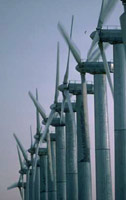 A group of Minnesota Senators, led by Senator Gary Kubly, introduced Bill S.F. No. 2233, which would require a study on the effect of importation of Manitoba hydropower on the development of renewable energy sources and related economic development in Minnesota. The Bill calls for the commissioner of commerce to contract an independent economic analysis of the effects of an increase in imports from new hydropower development in Manitoba on Minnesota renewable energy development, such as wind and biomass. The analysis would specifically address the impact of increased hydro importation on jobs, particularly in rural Minnesota. Results of the study would be reported to the chairs of the legislative committees with primary jurisdiction over energy and economic development issues by September 1, 2005. The Bill was referred mid February 2004 to the Committee on Jobs, Energy and Community Development.
A group of Minnesota Senators, led by Senator Gary Kubly, introduced Bill S.F. No. 2233, which would require a study on the effect of importation of Manitoba hydropower on the development of renewable energy sources and related economic development in Minnesota. The Bill calls for the commissioner of commerce to contract an independent economic analysis of the effects of an increase in imports from new hydropower development in Manitoba on Minnesota renewable energy development, such as wind and biomass. The analysis would specifically address the impact of increased hydro importation on jobs, particularly in rural Minnesota. Results of the study would be reported to the chairs of the legislative committees with primary jurisdiction over energy and economic development issues by September 1, 2005. The Bill was referred mid February 2004 to the Committee on Jobs, Energy and Community Development.View the Minnesota Bill S.F. 2233 View the updated Bill, as of February 19, 2004 Source: Minnesota State Legislature |
|
Call to Protect Pacific Ocean - CNF |
26 February 04 |
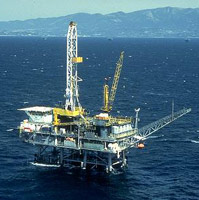 Following a report by the Royal Society of Canada that examines the idea of lifting the Pacific offshore oil and gas moratorium, the Canadian Nature Federation (CNF) is calling on the federal government to fulfill their promises to conserve Canada's oceans. The report was commissioned by the federal government to look at science issues related to oil and gas activity off the British Columbia coast. However, the current federal process to review the idea of lifting the offshore oil and gas moratorium is at odds with past commitments by the federal government to protect Canada's ocean waters.
Following a report by the Royal Society of Canada that examines the idea of lifting the Pacific offshore oil and gas moratorium, the Canadian Nature Federation (CNF) is calling on the federal government to fulfill their promises to conserve Canada's oceans. The report was commissioned by the federal government to look at science issues related to oil and gas activity off the British Columbia coast. However, the current federal process to review the idea of lifting the offshore oil and gas moratorium is at odds with past commitments by the federal government to protect Canada's ocean waters. "The Panel recognizes there are large science gaps and a need to create a series of marine protected areas in the Queen Charlotte Basin. It is essential that these protected areas be in place before assessing the feasibility of lifting the oil and gas moratorium," noted Julie Gelfand, President of the Canadian Nature Federation. The CNF asserts that Canada's foremost priority must be to set aside a network of marine protected areas to safeguard the region's incredible diversity of marine wildlife. View the February 20, 2004 CNF press release View the Government of Canada press release View the Royal Society of Canada report Source: Canadian Nature Federation |
|


 RSS Feeds:
RSS Feeds: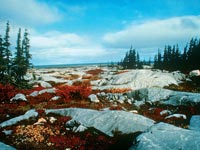 United States Interior Secretary Gale Norton has signed off on a plan to open 8.8 million acres of Alaska's North Slope to oil and gas development. The plan includes some areas important for migratory birds, whales and wildlife. Environmentalists say that the management plan threatens the health of Arctic tundra, ponds and lakes that are home to wildlife and migratory birds and provide a vital subsistence hunting and fishing ground for native Alaskans.
United States Interior Secretary Gale Norton has signed off on a plan to open 8.8 million acres of Alaska's North Slope to oil and gas development. The plan includes some areas important for migratory birds, whales and wildlife. Environmentalists say that the management plan threatens the health of Arctic tundra, ponds and lakes that are home to wildlife and migratory birds and provide a vital subsistence hunting and fishing ground for native Alaskans.